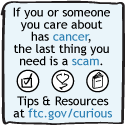Survivorship
People with lung cancer may experience symptoms caused by the cancer or by cancer treatments (side effects). Common symptoms include shortness of breath, coughing, wheezing, coughing up blood, pain, fever, and weight loss. These symptoms usually can be treated.1 Patients with lung cancer should discuss their concerns about symptoms and side effects with their doctors. Doctors can help answer questions and make a plan for comfort care. For more information about symptoms and side effects, visit Coping with Cancer.
People with lung cancer should quit smoking if they smoke.2 For help, visit smokefree.gov. CDC helps support a national network of quitlines that makes free "quit smoking" support available by telephone to smokers anywhere in the United States. The toll-free number is 1-800-QUITNOW (1-800-784-8669). Patients with lung cancer should ask their doctor about medical options that can aid smoking cessation such as nicotine replacement therapy, bupropion, or varenicline.
People with lung cancer should eat a healthy diet to keep up their strength.3 Side effects from cancer treatment such as nausea or appetite loss may make this challenging. For advice on eating well and dealing with eating problems caused by cancer treatment, visit Eating Hints.
Regular physical activity may improve quality of life after a lung cancer diagnosis.3 Patients with lung cancer should discuss an exercise plan with their doctor.
People with lung cancer and their family, friends, and caregivers may feel sad or overwhelmed by the cancer diagnosis and treatment. For information about finding or providing support for people with lung cancer and their caregivers, visit Caregivers for Cancer Patients and Survivors.Caregivers for Cancer Patients and Survivors.
References
1Kvale PA, Selecky PA, Prakash UBS. Palliative care in lung cancer: ACCP evidence-based clinical practice guidelines (2nd edition). Chest 2007;132(3 Suppl):368S–403S.
2U.S. Department of Health and Human Services. The Health Consequences of Smoking: A Report of the Surgeon General (1990).
3Doyle C, Kushi LH, Byers T, Courneya KS, Demark-Wahnefried W, Grant B, McTiernan A, Rock CL, Thompson C, Gansler T, Andrews KS. Nutrition and physical activity during and after cancer treatment: An American Cancer Society guide for informed choices. CA: A Cancer Journal for Clinicians 2006;56:323–353.

Contact Us:
- Centers for Disease Control and Prevention
Division of Cancer Prevention and Control
4770 Buford Hwy NE
MS K-64
Atlanta, GA 30341 - 800-CDC-INFO
(800-232-4636)
TTY: (888) 232-6348
8am–8pm ET
Monday–Friday
Closed on Holidays - cdcinfo@cdc.gov


